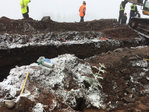


The family of a Chehalis wind farm worker who died last year while on the job has settled a wrongful death claim for $12 million after filing suit in King County Superior Court.
Pierce County Superior Court Judge James Orlando approved the settlement to the estate of Chehalis man Jonathan F. Stringer on Feb. 26.
The settlement, according to probate case documents filed in the court, is believed to be “one of the largest payments for the wrongful death of a single individual in Washington state history, and may be tied for the largest such settlement.” It’s also perhaps the final resolution in a nearly year-long effort to garner justice for the worker who died a preventable death.
The claim stems from a Jan. 9 incident in which 24-year-old Stringer attempted to dig out a coworker following a trench collapse at the Skookumchuck Wind Farm along the Lewis and Thurston county border. A second collapse buried and killed Stringer after he jumped in the trench attempting to save his coworker.
The estate’s beneficiaries include Stringer’s 3-year-old daughter. He is also survived by his fiance, Ashlee Thompson, who while not a beneficiary may be subject to a portion of the settlement by way of their “committed intimate relationship” status.
“Everyone involved in the matter is glad to have the matter brought to a full resolution and the family was comforted to know that the entities involved in this case had made changes following the death to make sure this hadn’t happened again,” said Nathan Roberts, an attorney with Connelly Law Offices representing the family. “Nothing’s going to bring Jonathan Stringer back, but the settlement does help provide for his family and young child he left behind.”
A Thursday phone call to Kubik Mediation Group for comment from the defendants went unreturned.
“The Stringer family has always been of utmost concern to our RES family and we are hopeful this settlement will bring important closure to them,” said Joel Leineke, president of RES-America Construction, the general contractor for the Skookumchuck Wind Project.
According to probate court documents, litigation attorneys will incur one-third of the settlement and $16,323 in fees. After costs associated with retaining an attorney and establishing a trust, at least roughly $7.9 million will be maintained in the trust by Connelly Law Offices. A guardian ad litem has also been appointed to oversee the estate until the court decides to discharge them.
Roberts said the details offered in the probate court filings hold up and that he could only recall one other settlement which was comparable in size.
Stringer’s estate originally filed suit against RES-America, RES-America Construction, and Weyerhaeuser back in May 2020 just a few months after his death.
Washington Labor and Industries issued more than $500,000 in fines to RES-America companies alone following an investigation, and Stringer’s estate added RES-America System 3, a subsidiary, to the lawsuit after it was fined eight violations totalling $360,874.
The lawsuit was originally filed in King County Superior Court with the plaintiffs seeking special damages including economic losses and attorney’s fees and costs. Mediation started though before the case could go to trial, and the settlement was agreed upon after two days of negotiations on Dec. 15, 2020.
Further court dates are expected in Pierce County Superior Court to determine how the net settlement proceeds should be divided between Thompson and her daughter through a settlement trust.
Stringer’s preventable death occurred on Jan. 9, 2020. He was working for Aerotek, a sub-contractor employed by RES-America, on the remote 38-turbine Skookumchuck Wind Project, located along a namesake ridge on the Thurston-Lewis county border.
Stringer was working on a three-man team that morning tasked with installing and burying an underground power line in low-vision, snowy conditions. At one point, one of Stringer’s coworkers was tasked with feeding a power cable through a culvert at the bottom of a trench that had no shoring or trench box on site.
The trench was narrow and between nine to 15 feet deep.
“As (the worker was) almost done feeding the strap under the culvert, a piece of the east side of the trench caved in on (the worker) completely covering him with about 12 to 18 inches of dirt and rock,” an incident report from the Thurston County Sheriff’s Office read.
Stringer and a third worker immediately jumped inside in an effort to dig out the covered worker. A second trench collapse then occurred, burying Stringer completely. The worker first buried was later transported 15 miles off the ridge, on forest service roads, to the hospital with serious injuries.
About 25 employees attempted to remove Stringer from the buried trench after they were radioed of the incident. Stringer screamed for several minutes under the pressure of the moist, collapsed earth, and his coworkers were unable to save him.
The wind project went online last November after many months of delays and now supplies energy through Puget Sound Energy’s Green Direct program.